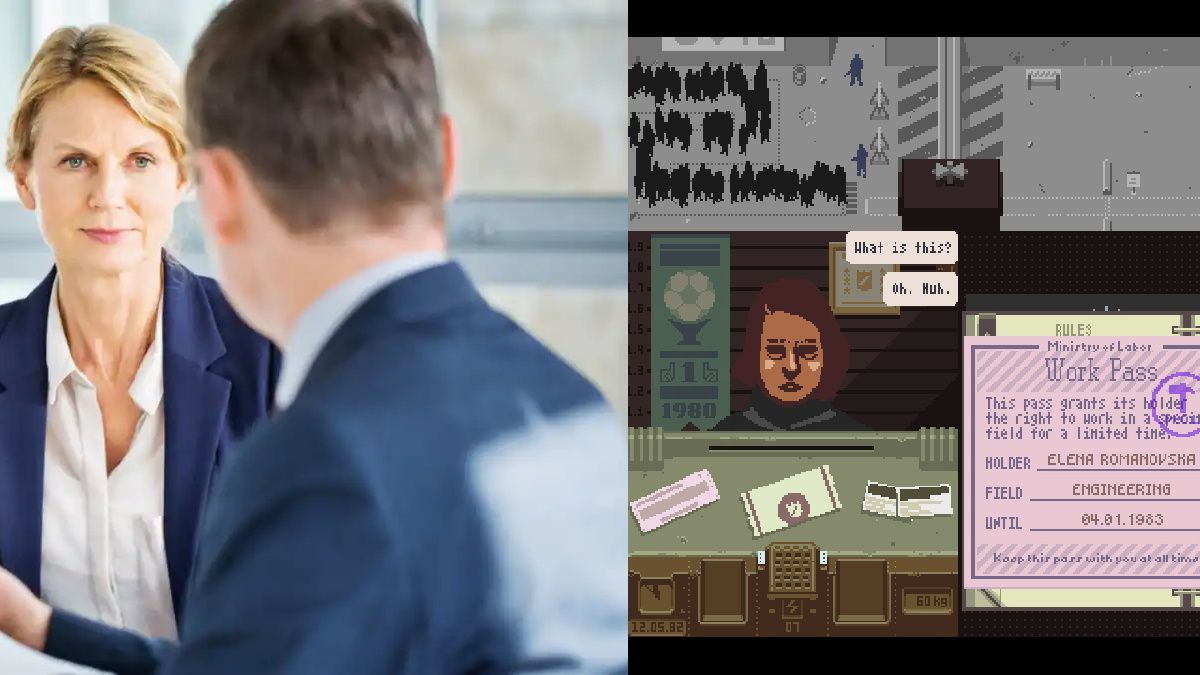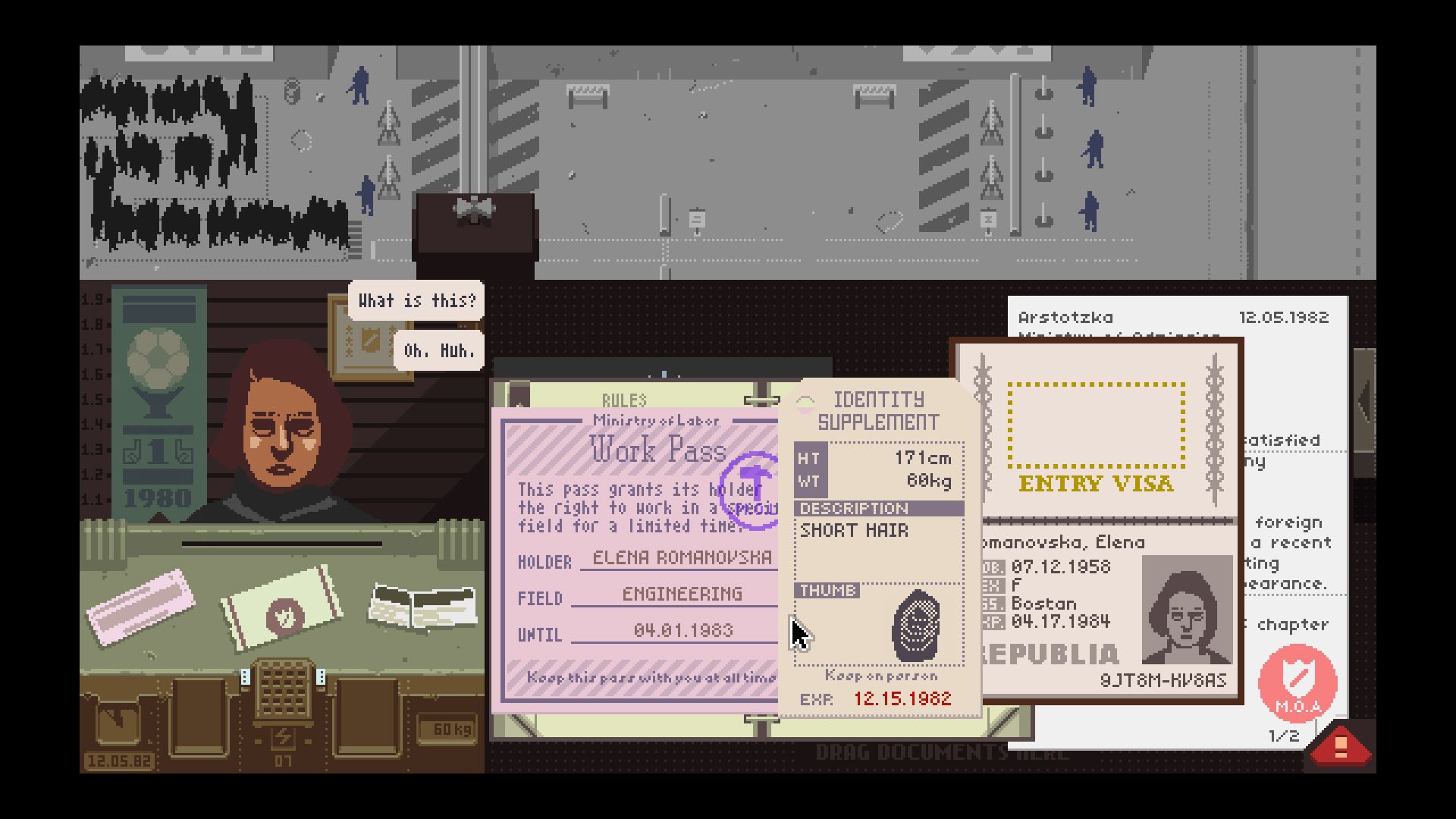Giving a Stamp of Approval
Gain an interviewing superpower from an unlikely source: a 2013 indie game about the cold war.

Hiring in technology is broken, full stop. Online application systems show their age when legitimate candidates are screened out, or demand an applicant fill out 14 pages of data after they've already uploaded a resume containing the exact same information. Interviews continue to contain esoteric coding puzzles that have nothing to do with the job description (though there are indications this trend is waning...finally). It doesn't help that one company's "Senior Developer" is another person's "Intern." And with so many marginalized groups trying to claw their way into the tech industry and getting turned down for no valid reason, how can we hope to move the needle in a meaningful way?
Let's talk about a blind spot we all have. Once you know about it and how it works, only then can you hope to defeat it. The good news: I have a game that will help you practice defeating it. First, though, let's chat about what the blind spot is: a cognitive bias known as The Fundamental Attribution Error.
Initial Impressions Often Wrong
Ever leave a bad tip for a waiter that messed up your order? Get upset when a friend brushes you off? Or how about making a judgement call about a family when you see their child throwing a tantrum in the middle of Target? All these are examples of us committing The Fundamental Attribution error. We all do it. At one point or another, we've evaluated a situation and made a snap judgement: a person is behaving a certain way because that's who they are...and not, in fact, the more likely explanation: they they are behaving that way based on a specific situation you happen to catch them in.
The human mind has evolved to take short-cuts, whenever possible. It's the reason we're able to manage the mind-numbing amount of decisions we make on a daily basis. We're so good at this, in fact, that there is a part of the brain dedicated to taking complex instructions and burying them in long-term memory so that we don't even think about them while we perform them – which is why you rarely remember all the individual things you had to do to get from home to work (if you want a great book on just this subject, check out "The Power of Habit: Why We Do What We Do in Life and Business"). These short-cuts, unfortunately, do not always produce a healthy outcome.
When we attribute cause for someone's behavior, all we have to go on is consistency. If a manager blows up at us on a regular basis, we attribute that behavior to their personality, rather than the situation at hand. But for consistency to be a variable in this equation, there must also be history: what does that manager's behavior look like, compared to your previous experiences with them? When there is no history – when this is the first time you've ever met your waiter at a restaurant – you take a mental shortcut when your order shows up wrong, ignoring the absence of important facts, and that shortcut feels right. "They're just not very good at their job" is a far easier conclusion to come to than "The wait staff is short today, the chef is new, and the waiter received information 10 minutes prior to your order that their mother was going into surgery."
The Fundamental Attribution Error affects everyone – it's impact is most notable in wrongful convictions. But you do not have to be in law enforcement to have your judgement skewed. All that is needed is you, a stranger, and a situation in which you need to make a judgement call about a person's expertise, reliability, or skill. In other words: a candidate interview for your next software development role.
So, how do you get ahead of this? How do you fight against several thousand years of evolutionary behavior?
Papers, Please.

Glory to Arstotzka!
In 2013, Lucas Pope released an indie game titled Papers, Please, which is set in the fictional cold war Russia-like country of Arstotzka. In the game, you play a border crossing guard that is given explicit, non-negotiable instructions: review all potential entrants at the border, examine their documents, deny those with discrepancies, and approve the rest.
Since you are paid based on the number of people you move through the border, the pressure is on to make thoughtful, educated guesses about each entrant in as little time as possible (this pressure is exacerbated once you learn of your family being home in the cold, starving, and in need of medicine). So, presented with facts that appear in their passports, identification cards, work permits, and so on, you are thrown curveballs in how each entrant speaks to you, what they say, and how they behave at the border crossing.
This isn't just my opinion. One of my favorite psychology/sociology podcasts talked about Papers, Please as far back as 2013 – the year the game came out. Give it a listen. It's fascinating listening to David McRaney and his wife play through the game, discussing all the various ways in which our emotions skew our judgement, especially in the absence of facts and historical data.
Papers, Please is a constant test of the Fundamental Attribution Error. Did this entrant forget to provide her passport because she is a criminal? Or is she simply nervous because she (like you) has learned of a recent terrorist attack at this very crossing? What about the entrant in which their story – crossing the border for 2 months on a work permit – lines up with all their documentation...except for the fact that their birthdate would make them a 4 year old, and not a 40 year old like the person standing before you.
Diamond in the Rough
What makes any one candidate better or worse than another? Sticking to a proven tech interview script provides the best chance of success. But better still is defeating your own innate tendency to want to exclude a candidate for a particular response you think must immediately disqualify them because "you know best." Chances are you don't know. The only way to get better at this is practice – to flex that muscle until it strengthens. You can do this right now via Papers, Please.
Everyone battles their own demons and many do a very good job not to let you in on that knowledge (it isn't any of your business!) But that doesn't mean those battles can't rise up at inopportune times and affect a person's behavior. Think about the last time you received dreadful news, perhaps about a loved one. How do you think you would've done if a Zoom interview had popped-up, moments later?
Stick to the interview script. Resist the temptation to dismiss a candidate as too lazy, too tired, too hyperkinetic, too uninspired – or perhaps the single worst excuse of all: "not a culture fit." The likelihood is high that you are making a snap judgement based on incomplete information and missing out on a diamond in the rough. The Approved passport stamp is what you want to use, after all. You must only reach for the Denied stamp in face of irrefutable evidence. Trusting your gut is simply not enough.
